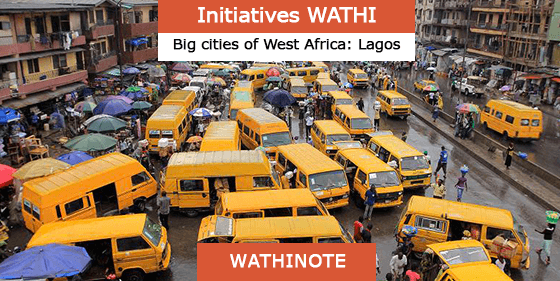

Author(s): Olamide Udoma-Ejorh
Affiliated Institution: Development and Cooperation
Type of Publication: Article
Publication Date: 17 September 2016
Lagos is the commercial centre of Nigeria. Once known mostly for crime and dysfunction, the agglomeration’s international reputation has recently been improving considerably. Better governance is making a difference.
Lagos State is a booming urban agglomeration with over 21 million people. It has 37 municipal authorities, including the city of Lagos. Since the baton passed on from the previous Governor Babatunde Raji Fashola to the present Governor Akinwunmi Ambode in May 2015, Lagos has experienced many changes. Most of them are positive.
Before Ambode took office, he seemed to be the weaker candidate. He was criticised for only speaking when he had a scripted or prepared speech, and the previous governors seemed more charismatic. Gbadamosi Bakari wrote in the Guardian, a Nigerian newspaper: “Mr Ambode struggles manfully but struggles none-the-less, to articulate or even grasp the issues pertinent to the further development of the state he professes to come from and wants to govern.” The assessment of other journalists was hardly kinder.
Nonetheless, Ambode won the election and became the governor of Lagos State. Many argue that this was due to the very popular party he belongs. His predecessor was from the same party, which is now in power at the federal level too.
Since the baton passed on from the previous Governor Babatunde Raji Fashola to the present Governor Akinwunmi Ambode in May 2015, Lagos has experienced many changes. Most of them are positive
Ambode certainly benefits from the previous administration’s adoption of a state-wide plan for urbanisation. To keep Lagos moving, however, he has to make competent decisions and implement the plan. So far he has done that well. From day one, Ambode’s administration has focused on “all inclusive governance”. According to the governor, this term means that no one and no segment of society must be left behind, “irrespective of colour, race, faith, status, ability or disability”. Moreover, the governor wants the people to be actively involved in decision-making.
For this purpose, he established a new Office of Civic Engagement. Other agencies of the state government have been streamlined to better serve the needs of Lagosians. At the same time, administrative costs have been reduced.
In the past, local governments tended to be weak and ineffective in Nigeria. They lacked knowledge, skills and funds. This is changing. Lagos State is empowering municipal governments to carry out infrastructure development within their jurisdictions. For example, they now play a vital role in improving the agglomeration’s traffic situation.
Security is another top concern. A campaign called “Light up Lagos” has been launched. The idea is to illuminate all major highways and areas of commercial activity all night long. So far, some 20 areas have been lit up, improving safety and resident’s livelihoods.
Food production has not been overlooked. A huge metropolis needs food security, especially as food prices are currently rising fast. Ambode’s administration has signed a deal with the government of Kebbi State in north-western Nigeria to safeguard the provision of affordable rice.
Other agencies of the state government have been streamlined to better serve the needs of Lagosians. At the same time, administrative costs have been reduced
Tourism, sports and culture have only recently been recognised for their economic impact. Related activities are now high on the agenda. One example was the Lagos City Marathon in February. It attracted both international and local long-distance runners. Most Nigerians wanted a Nigerian to win, but Abraham Kipton from Kenya came in first. Spanish football giants Barcelona visited Lagos to help establish a football academy. They were hosted by the governor.
It is a breath of fresh air that Ambode acknowledges the majority of residents in Lagos and is aiming for more inclusive governance. The governor is not perfect, of course. He has recently put together a new task force with the job of cleaning up parts of Lagos, and they have so far done more damage than good, harassing marginalised people. Moreover, an initiative taken by the state government to prohibit hawking on the agglomeration’s roads may make sense in making traffic flow, but it has hurt the disadvantaged community of those who depend on peddling goods on the streets.
Whether the state government’s track record stays as good as it currently looks remains to be seen.
P.S. After the March 2019 gubernatorial elections, Ambode was replaced by Babajide Sanwo-Olu as the Governor of Lagos State
Les Wathinotes sont soit des résumés de publications sélectionnées par WATHI, conformes aux résumés originaux, soit des versions modifiées des résumés originaux, soit des extraits choisis par WATHI compte tenu de leur pertinence par rapport au thème du Débat. Lorsque les publications et leurs résumés ne sont disponibles qu’en français ou en anglais, WATHI se charge de la traduction des extraits choisis dans l’autre langue. Toutes les Wathinotes renvoient aux publications originales et intégrales qui ne sont pas hébergées par le site de WATHI, et sont destinées à promouvoir la lecture de ces documents, fruit du travail de recherche d’universitaires et d’experts.
The Wathinotes are either original abstracts of publications selected by WATHI, modified original summaries or publication quotes selected for their relevance for the theme of the Debate. When publications and abstracts are only available either in French or in English, the translation is done by WATHI. All the Wathinotes link to the original and integral publications that are not hosted on the WATHI website. WATHI participates to the promotion of these documents that have been written by university professors and experts.
